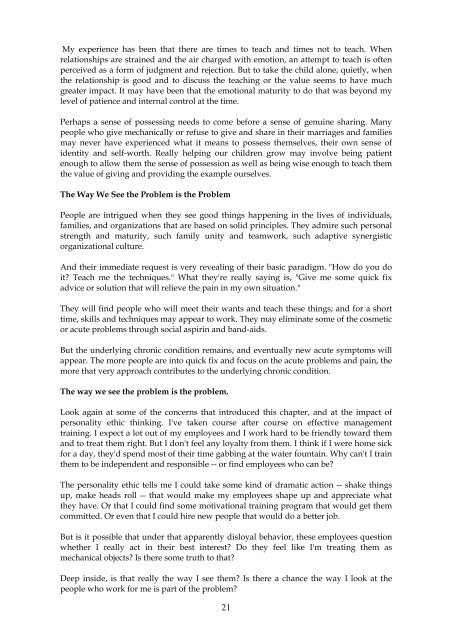Covey - The 7 habits of highly effective people
Create successful ePaper yourself
Turn your PDF publications into a flip-book with our unique Google optimized e-Paper software.
My experience has been that there are times to teach and times not to teach. When<br />
relationships are strained and the air charged with emotion, an attempt to teach is <strong>of</strong>ten<br />
perceived as a form <strong>of</strong> judgment and rejection. But to take the child alone, quietly, when<br />
the relationship is good and to discuss the teaching or the value seems to have much<br />
greater impact. It may have been that the emotional maturity to do that was beyond my<br />
level <strong>of</strong> patience and internal control at the time.<br />
Perhaps a sense <strong>of</strong> possessing needs to come before a sense <strong>of</strong> genuine sharing. Many<br />
<strong>people</strong> who give mechanically or refuse to give and share in their marriages and families<br />
may never have experienced what it means to possess themselves, their own sense <strong>of</strong><br />
identity and self-worth. Really helping our children grow may involve being patient<br />
enough to allow them the sense <strong>of</strong> possession as well as being wise enough to teach them<br />
the value <strong>of</strong> giving and providing the example ourselves.<br />
<strong>The</strong> Way We See the Problem is the Problem<br />
People are intrigued when they see good things happening in the lives <strong>of</strong> individuals,<br />
families, and organizations that are based on solid principles. <strong>The</strong>y admire such personal<br />
strength and maturity, such family unity and teamwork, such adaptive synergistic<br />
organizational culture.<br />
And their immediate request is very revealing <strong>of</strong> their basic paradigm. "How do you do<br />
it? Teach me the techniques." What they're really saying is, "Give me some quick fix<br />
advice or solution that will relieve the pain in my own situation."<br />
<strong>The</strong>y will find <strong>people</strong> who will meet their wants and teach these things; and for a short<br />
time, skills and techniques may appear to work. <strong>The</strong>y may eliminate some <strong>of</strong> the cosmetic<br />
or acute problems through social aspirin and band-aids.<br />
But the underlying chronic condition remains, and eventually new acute symptoms will<br />
appear. <strong>The</strong> more <strong>people</strong> are into quick fix and focus on the acute problems and pain, the<br />
more that very approach contributes to the underlying chronic condition.<br />
<strong>The</strong> way we see the problem is the problem.<br />
Look again at some <strong>of</strong> the concerns that introduced this chapter, and at the impact <strong>of</strong><br />
personality ethic thinking. I've taken course after course on <strong>effective</strong> management<br />
training. I expect a lot out <strong>of</strong> my employees and I work hard to be friendly toward them<br />
and to treat them right. But I don't feel any loyalty from them. I think if I were home sick<br />
for a day, they'd spend most <strong>of</strong> their time gabbing at the water fountain. Why can't I train<br />
them to be independent and responsible -- or find employees who can be?<br />
<strong>The</strong> personality ethic tells me I could take some kind <strong>of</strong> dramatic action -- shake things<br />
up, make heads roll -- that would make my employees shape up and appreciate what<br />
they have. Or that I could find some motivational training program that would get them<br />
committed. Or even that I could hire new <strong>people</strong> that would do a better job.<br />
But is it possible that under that apparently disloyal behavior, these employees question<br />
whether I really act in their best interest? Do they feel like I'm treating them as<br />
mechanical objects? Is there some truth to that?<br />
Deep inside, is that really the way I see them? Is there a chance the way I look at the<br />
<strong>people</strong> who work for me is part <strong>of</strong> the problem?<br />
21


